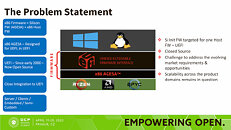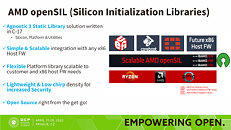During the OCP Regional Summit, AMD has shared plans to replace AGESA with openSIL. The change will not come soon, and according to details, it will be a slow process starting in 2026. AGESA firmware updates are quite important but also vulnerable to cyber-attacks, which is one of the key points for the new OpenSIL, which is proposed as an open-source solution.
As detailed by Phoronix, AMD mentioned the Open-Source Silicon Initialization Library (openSIL) back in mid-April, when it launched initial support for 4th Gen EPYC processors and its reference platform. Although initially aimed at server processors, AMD has made clear during the OCP presentation that the OpenSIL is meant to be a replacement to AMD Generic Encapsulated Software Architecture (AGESA), covering the entire product stack. As said, AMD plans for openSIL to be simple, easily scalable, lightweight, and open-source, thus increasing the overall security.



Raj Kapoor, AMD Fellow and Chief Firmware Architect shared a bit more details about the challenges that AGESA brings, and said that: "AMD openSIL will be scaling to both server and client platforms by the 2026 timeframe." During Q&A, he added that "AGESA will be end of life, openSIL will replace it."
Considering the timeframe, openSIL won't be ready before AMD launches Zen 6 or even Zen 7 CPUs, at least on the client side, while the proof of concept code for the AMD 4th Gen EPYC Genoa server CPUs will be ready soon.
View at TechPowerUp Main Site | Source
As detailed by Phoronix, AMD mentioned the Open-Source Silicon Initialization Library (openSIL) back in mid-April, when it launched initial support for 4th Gen EPYC processors and its reference platform. Although initially aimed at server processors, AMD has made clear during the OCP presentation that the OpenSIL is meant to be a replacement to AMD Generic Encapsulated Software Architecture (AGESA), covering the entire product stack. As said, AMD plans for openSIL to be simple, easily scalable, lightweight, and open-source, thus increasing the overall security.



Raj Kapoor, AMD Fellow and Chief Firmware Architect shared a bit more details about the challenges that AGESA brings, and said that: "AMD openSIL will be scaling to both server and client platforms by the 2026 timeframe." During Q&A, he added that "AGESA will be end of life, openSIL will replace it."
Considering the timeframe, openSIL won't be ready before AMD launches Zen 6 or even Zen 7 CPUs, at least on the client side, while the proof of concept code for the AMD 4th Gen EPYC Genoa server CPUs will be ready soon.
View at TechPowerUp Main Site | Source







